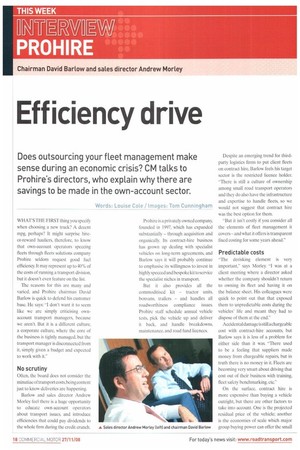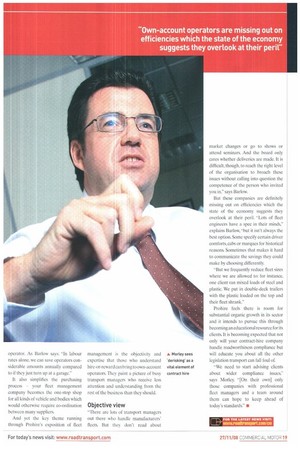Efficiency drive
Page 18

Page 19

If you've noticed an error in this article please click here to report it so we can fix it.
Does outsourcing your fleet management make sense during an economic crisis? CM talks to Prohire's directors, who explain why there are savings to be made in the own-account sector.
Words: Louise Cole Images: Tom Cunningham WHAT'S THE FIRST thing you specify when choosing a new truck? A decent mpg, perhaps? It might surprise hireor-reward hauliers, therefore, to know that own-account operators speccing fleets through fleets solutions company Prohire seldom request good fuel efficiency It may represent up to 40% of the costs of running a transport division, but it doesn't even feature on the list.
The reasons for this are many and varied, and Prohire chairman David Barlow is quick to defend his customer base. He says: "I don't want it to seem like we are simply criticising ownaccount transport managers, because we aren't. But it is a different culture, a corporate culture, where the core of the business is tightly managed, but the transport manager is disconnected from it, simply given a budget and expected to work with it.
No scrutiny
Often, the board does not consider the minutiae of transport costs,being content just to know deliveries are happening.
Barlow and sales director Andrew Morley feel there is a huge opportunity to educate own-account operators about transport issues, and introduce efficiencies that could pay dividends to the whole firm during the credit crunch. Prohire is a privately owned company, founded in 1997, which has expanded substantially — through acquisition and organically. Its contract-hire business has grown up dealing with specialist vehicles on long-term agreements, and Barlow says it will probably continue to emphasise its willingness to invest in highlyspecced and bespoke kit to service the specialist niches in transport.
But it also provides all the commoditised kit — tractor units, boxvans, trailers — and handles all roadworthiness compliance issues. Prohire staff schedule annual vehicle tests, pick the vehicle up and deliver it back, and handle breakdowns, maintenance, and road fund licences. Despite an emerging trend for thirdparty logistics firms to put client fleets on contract hire, Barlow feels his target sector is the restricted licence holder. "There is still a culture of ownership among small road transport operators and they do also have the infrastructure and expertise to handle fleets, so we would not suggest that contract hire was the best option for them.
"But it isn't costly if you consider all the elements of fleet management it covers —and what it offers is transparent fixed costing for some years ahead."
Predictable costs
The derisking element is very important," says Morley. "I was at a client meeting where a director asked whether the company shouldn't return to owning its fleet and having it on the balance sheet. His colleagues were quick to point out that that exposed them to unpredictable costs during the vehicles' life and meant they had to dispose of them at the end."
Accidental damage is still a chargeable cost with contract-hire accounts, but Barlow says it is less of a problem for either side than it was. "There used to be a feeling that suppliers made money from chargeable repairs, but in truth there is no money in it. Fleets are becoming very smart about driving that cost out of their business with training, fleet safety benchmarking. etc."
On the surface, contract hire is more expensive than buying a vehicle outright, but there are other factors to take into account. One is the projected residual price of the vehicle: another is the economies of scale which major group buying power can offer the small operator. As Barlow says: "In labour rates alone, we can save operators considerable amounts annually compared to if they just turn up at a garage."
It also simplifies the purchasing process your fleet management company becomes the one-stop shop for all kinds of vehicle and bodies which would otherwise require co-ordination between many suppliers.
And yet the key theme running through Prohire's exposition of fleet management is the objectivity and expertise that those who understand hire-or-reward can bring to own-account operators. They paint a picture of busy transport managers who receive less attention and understanding from the rest of the business than they should.
Objective view -There are lots of transport managers out there who handle manufacturers' fleets. But they don't read about
market changes or go to shows or attend seminars. And the board only cares whether deliveries are made. It is difficult, though, to reach the right level of the organisation to broach these issues without calling into question the competence of the person who invited you in," says Barlow.
But these companies are definitely missing out on efficiencies which the state of the economy suggests they overlook at their peril. "Lots of fleet engineers have a spec in their minds," explains Barlow, "but it isn't always the best option. Some specify certain driver comforts, cabs or marques for historical reasons. Sometimes that makes it hard to communicate the sayings they could make by choosing differently.
"But we frequently reduce fleet sizes where we are allowed to: for instance, one client ran mixed loads of steel and plastic. We put in double-deck trailers with the plastic loaded on the top and their fleet shrank."
Prohire feels there is room for substantial organic growth in its sector and it intends to pursue this through becoming an educational resource fonts clients. It is becoming expected that not only will your contract-hire company handle roadworthiness compliance hut will educate you about all the other legislation transport can fall foul of.
We need to start advising clients about wider compliance issues," says Morley. "[On their own] only those companies with professional fleet managers and a team around them can hope to keep ahead of today's standards." it
FOR THE LATEST NEWS VIS1T! WWW.PaailtranSPOPLCOMICM




















































































































































